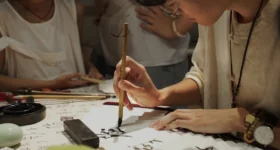
The Heart Fable
Once upon a time, there was a village where everyone’s hearts were made of metal. Some
had hearts of iron and walked around with fisted, guarded looks. Others had hearts of mercury,
and kept shops or ran errands around town, cunning and fleet-footed.
The formation started in adolescence, when a child’s moldable flesh began to harden,
growing walls around their soul. They were taught that the heart was their soul’s embodiment, so
it became customary for people to go about their days clad in the metals that matched their
hearts, from bracelets to piercings to clothes laced with metal thread. They strode through the
streets, each a glimmering star. Those with hearts too ugly or common to be forged into
something valuable simply displayed nothing and were deemed lesser.
The village kept a record book of all the known metal hearts, from nickel to brass, zinc to
tin and of who had which. But while the people had gotten quite good at differentiating them, no
one could be truly sure about the substance of another’s soul. Thus, there came a tradition that
upon a person’s death, their heart was extracted to reveal their true self. The adults did it to have
peace of mind. The children—who had yet to grow hearts—made it a game, betting pieces of
candy against each other at funerals and triumphantly (or dejectedly) walking away. The
adolescents looked solemnly upon each reveal of a lesser metal and prayed for a heart they
would be proud to call their own. In this way, funerals become public town events.
In this village, there lived a young jeweler who was acknowledged throughout the town
as having the one true heart of gold. While many people claimed to have a heart of gold after
going to a diviner or studying their horoscopes, a true golden heart emerged through one’s
actions, not through declaration, which made the jeweler’s heart all the more veritable.
The jeweler’s shop in the corner of town square was always flooded with people. Her
customers figured that whatever she made would be of the highest quality. All the richest and
noble families desired her services, attended public events clad from head to toe in her
workmanship. Perhaps it was only because she was gold-hearted that the village let her become a
jeweler in the first place. Those with hearts hewn from lesser metals were usually barred from
such important occupations. Whether there was a difference in quality or not, the jeweler put her
all into her work, each ornament infused with a bit of her soul.
No one could remember who started calling the jeweler gold-hearted. It just sort of
happened and over the years it became a truth. But the signs were always there. As a child, she
had been helpful and proactive around town, lending everyone a hand or an ear. As she grew
older, her skillset only increased. Need marital advice? Ask the jeweler. No, she isn’t married, but
her recommendations are universal! Need someone to watch your kids while you visit the
market? The gold jeweler, she’ll take them. Need consolation? Miss Gold will rest your mind.
Need anything? Miss Gold would do it best.
Sometimes gold really felt like the solution to everything, especially in the jeweler’s line
of work. Ladies would queue outside her shop, each fretting over some kind of invisible ugliness
they knew they had. And maybe because Miss Gold wasn’t a doctor, she never saw any symptom
of ugliness beyond their vocalizations of it. She simply cut their jewelry, each curl of a bronze
leaf, each link of a silver chain, imbued with all the beauty she could muster.
One winter, the village head’s daughter wandered into her shop. The girl, barely ten years
of age, stumbled through the doorway, pompously brushing snowflakes from her shoulders as if
she had returned home. She carried herself like a stray cat, proud and wary.
She crept up to the counter where Miss Gold sat. “Hello. Everyone says you’re good at
answering questions.”
The jeweler chuckled. “I wouldn’t say I’m good at it, but I always try. Ask away.”
“I was wondering, does the person define the heart, or does the heart define the person?”
Miss Gold studied the girl. She was a peculiar child, glowing with curiosity—as most
children did, before their hearts solidified—beneath a rigid mask of dignity that came with her
station.
“What’s your name?”
“Catherine,” the girl said. Then she added, “My papa’s the village head.”
“Well, Catherine, I’m afraid I don’t have an answer. It’s a topic I never really
considered.”
“Really? Not even when you were little, like me?”
“No, I was concerned about… other things.” The jeweler smiled. “I’ll mull it over and
give you an answer another day.”
Catherine frowned. Adults, especially the type who associated with her father, usually
said that exact phrase when they wanted her to drop a subject. But she didn’t feel that way with
Miss Gold. Miss Gold. She nodded, instead.
“Can I find you tomorrow?”
“Visit anytime you wish.”
And so the next day Catherine came back, and left answer-less. And the day after, and the
day after that, each day for the next four years. Soon, Miss Gold’s “I’m sorry, I still don’t have an
answer,” became an expectation. So, Catherine stopped asking. Instead, she would spend hours
meandering about the periphery of the small shop, where Miss Gold displayed several dozen of
her best creations in quaint glass cabinets. Catherine always managed to find new details in each
piece, no matter how many times she had looked at it before. She marveled at Miss Gold’s
smelting, at the way metal bent to her will. She observed each silver and bronze-hearted
individual—many of whom she personally knew—trudge into the shop, burdened by some
perceived fault they believed could be masked by jewelry.
But despite the customer’s personal insecurities, no one ever commented on the jeweler’s
appearance. Miss Gold’s facial structure didn’t align well, and her time spent forging and
shaping metal had made her bulky and muscular, especially in the arms and shoulders. She also
had a hunched back, disfigured from all the nights she spent bent over the craftstable. When
compared to the jewelry she made, Miss Gold could even be called ugly. But it didn’t matter, not
to Catherine. There was a deeper beauty stored inside her, brighter than the Sun.
Yet, over the years, simply observing wasn’t enough for Catherine. Simply living wasn’t
enough. Something was missing. Catherine would trudge home sometimes and pause in the
middle of the street, suddenly baffled by the physics that let her control her own limbs. When she
sat through her parents’ admonishments or compliments, she never felt any of their words land.
Her friends’ voices came through muffled, as if shouted upwind.
“It’s just a phase,” Miss Gold said, peering at a work-in-progress set of cufflinks.
“Really?”
“Children tend to feel estranged when they reach adolescence and start growing hearts.”
Growing a heart. Catherine slumped down on the counter, head on her arms. She peeked
at Miss Gold through strands of fallen hair and sulked.
“You still haven’t given me an answer.”
The jeweler didn’t look at her, but furrowed her brow in response.
Catherine huffed, “My question! Does the person define the heart, or does the heart
define the person? You said you would give me an answer someday, and it’s been four years!”
Miss Gold’s calloused hands halted. She examined the adolescent girl leaning across the
counter. The stray cat from all those years ago was still a stray, but her pride had long since faded
to desperation.
“This is about a gold heart, isn’t it?”
When Miss Gold met her eyes, Catherine lowered her gaze and stammered, “I just want
to know. I’ve tried doing what you’re doing. I’ve tried to help people, to be as nice as possible.
At my school, around town, I tried so hard! But no one’s saying I’m gold! Is it because I’m doing
something wrong? Or is it predestined?”
The jeweler looked down at the half-finished necklace she was making, each golden leaf
carefully molded and trimmed under smoldering heat, and shook her head.
“I don’t know, Catherine. Sometimes answers are beyond our ability to find. Sometimes,
answers need the right person to say them. Sometimes, there are simply no answers at all. All I
know is that I have none.”
“Then, do you have a way to help me get a gold heart?”
“Why do you want one so badly?”
Catherine couldn’t find the words. She took in the kind yet exhausted lines stretching
across Miss Gold’s face, marring her youth. But those lines were accomplishments, testaments to
her standing. Walk into any house in the village, and in the lady’s cabinet there will be jewelry
made by Miss Gold.
And what about Catherine? When other villagers recognized her, they saw first her
father— “Look, that’s the village head’s daughter! Hasn’t she grown to be a beautiful and bright
young woman? And she’s so mature. Her parents have raised her well. She’ll be a bronze, I bet,
or maybe even a silver.” Silver? The village had dozens of them. No, Catherine had to be gold.
“I just want something that belongs to me, something to put my name on.”
The door swung open and a middle-aged lady sauntered in before pausing. “Is this a bad
time?”
Miss Gold sprang up. “Of course not, Madam Rena. I have your order right here.”
“Splendid! Thank you, Miss Gold.” The lady’s countenance glowed like polished
platinum. Madam Rena shredded the parcel’s outer wrapping and lifted up a dazzling pair of
earrings, with five gleaming leaves each arranged in a star-shape and inlaid with small emeralds.
Catherine, barely an arms width away, sucked in a breath. She watched Madam Rena try the
earrings on, watched her beam. At that moment, the lady seemed even brighter than Miss Gold.
When Madam Rena left the shop, her head held a foot taller than when she entered,
Catherine turned to the jeweler. “Miss Gold, I want to commission the most beautiful gold
necklace in the world, so that I’ll shine just like Madam Rena did. But even more.”
“That’s not how you get a gold heart, Catherine.”
“But what else can I do? I’ve done everything I can to increase my chances.”
The jeweler faltered, recognizing the walls of denial calcifying around Catherine’s soul.
“Please help me, Miss Gold. Really, just this once,” the young woman promised. “Just so
I can prove gold fits me. You know how important this is to me.”
Miss Gold searched Catherine’s eyes. She had never understood her obsession with a
gold heart. As long as Miss Gold lived, her heart would never belong to just herself. Always,
people would covet it, clawing through the shop door to get a piece of her. Catherine craved the
attention granted by a golden heart without realizing how much she would have to give away.
That’s the problem.
Maybe Miss Gold would just show her. She nodded. “Alright.”
It was like a spell had broken. Catherine’s face broke into a wide, relieved smile. She
straightened up and bowed her head. “Thank you!”
When Catherine left the shop that evening, all Miss Gold could see was that smile. It
hung in the corner of her vision, in the halo of each candle, the shadows cast onto the floor. It
was the same smile of her previous customer, and the one before that, and so on.
She got up and paced, coming to a stop before the gallery of necklaces around the shop.
Her greatest creations, never worn by a soul, perpetually displayed to dazzle newcomers with
their beauty. To draw attention away from her own appearance.
Miss Gold touched a finger to her cheek. Before she had been Miss Gold she had been a
plain child living on the outskirts of the village. Unbecoming and scrawny to the bone, people
said, which made jewelling all the more appealing. At least it proved that she still had beauty left
inside her, proved that she could still be desired, if not for her appearance then for her talents and
skill. So the plain child ran around town helping everyone out, desperate to show the world what
she could offer, what she could be.
Maybe that’s why she and Catherine had become so close. They both wanted to be
noticed. But Miss Gold tried to prove herself by making others beautiful, and Catherine by
obtaining a gold heart. What had been an accidental boon to the jeweler set an example for the
hopeful girl instead. In the end, maybe it really was all Miss Gold’s fault. She stared out the
shutters at the rainstorm beyond her shop walls.
Having failed to satisfy Catherine’s question, the least Miss Gold could do now was make
her a piece of jewelry. She sat back down before her desk and smoothed out a blank piece of
paper. For Catherine, this necklace would have to be a masterpiece. It would have to be pure
gold, no doubt, maybe inlaid with orange-pink jewels for depth. It should be minimalist, befitting
Catherine’s age, but also to maintain a sense of otherworldliness. Should it be a pendant type or a
collar type? How thick? How thin?
In such a manner, Miss Gold sketched away through the night. At dawn, she fuzzily
stumbled to the door and put up a handwritten notice: Closed for three days. Not even when
Catherine came knocking did she leave her work. She ate through her store of emergency
provisions, slept fitfully against an ash-covered pillow, and flinched when a little sunlight filtered
in through the window shades and reflected off her metals. Miss Gold worked and worked,
shaping each curve to perfection, pouring every ounce of warmth into the necklace. Catherine’s
smile haunted her at every step.
On the third day, Miss Gold lifted the finished necklace with trembling, exhausted
fingers. The pendant hung heavy and cool. She tried letting it flash in the light. But it didn’t.
There was something dull about it, almost gilded. The ghost of Catherine’s smile hung in the air,
looking unimpressed. It would never be good enough, Miss Gold realized. No jewelry would
ever fill an empty heart.
But she had nothing left to offer.
Clutching the necklace, Miss Gold laid her head between her arms and rested for what
felt like the first time since she picked up a pair of pliers as a child.
On the fifth day, a queue of townsfolk had lined up at her door, each with their own wants
and hopes. It was mid-summer and the heat only added fuel to their fervent needs. When Miss
Gold still showed no sign of movement, the queue became angry. The queue became a mob.
They broke her shop door down, but their anger dissipated when a sour smell wafted from the
dark shop interior. Lying with its head between its arms, in a napping position, was Miss Gold’s
two-day old corpse. The villagers carried the body outside. From the sidelines, a certain
adolescent girl watched with a sick horror.
One of the townsfolk noticed Miss Gold’s hand and pried open her fingers to retrieve a
dazzling pendant necklace. On the back, it was engraved: “To you, my gold-hearted.” There was
no specified name.
They showed the necklace to everyone, searching for the intended owner with a gold
heart. When no one stepped forth to claim it, the villagers decided it should be buried with Miss
Gold, a final testament to her legacy.
At the funeral, Catherine couldn’t help but approach the coffin. The entire village was
there, but she had no problem passing through the crowd as if she had become a ghost. She laid a
hand on the open casket, marveled at how her fingers didn’t feel like hers, stared at the gray,
foreign face caked in soot. Catherine laid her other hand over her own chest and felt nothing
there.
The funeral surgeon came through with the heart retrieval knife, and bent over Miss
Gold. Catherine could hear the vague chittering of younger children at the edge of the crowd,
placing their bets on the nature of the jeweler’s heart. She clenched her fist. How dare they bet?
Did they realize who lay in the casket? Did it even make sense to bet?
It was over quickly. The sharp tip of the knife dug into the corpse. Catherine didn’t look
away, didn’t even blink. The surgeon reached in and plucked out Miss Gold’s heart.
Catherine squinted. Was it just the sun in her eyes, or was the heart gray-colored? The
town drew a collective breath. Each person flipped through their memories, analyzing how they
had gotten it so wrong. The ladies who had worn her jewelry to the funeral traced the metallic
leaves on their bracelets, their floral hair clips, the mini chains woven into their outfits, with
dread. How could it be? Had Miss Gold deceived the town, or had the town deceived her? Could
they even call her Miss Gold now?
All around, there was the silent crack and snap of judgments. For the heart in the
surgeon’s hand, held aloft for all to see, wasn’t gold, but instead, a crumbling hunk of lead.
Through blurring eyes, Catherine traced the heart’s shriveled outline. Was this the answer
Miss Gold could never give?
Suddenly, Catherine felt something igniting in her chest. It smoldered and melted into an
indescribable, poisonous substance, a writhing mess of contradiction and forgery. She winced
and hunched down, reaching out blindly for something to hold on to and grasping only the cold,
solid rim of Miss Gold’s casket. The pain was so bright, burning like a star. All Catherine could
do was close her eyes and wish for darkness.
The End.













Leave a Comment